Risen 2: Dark Waters preview
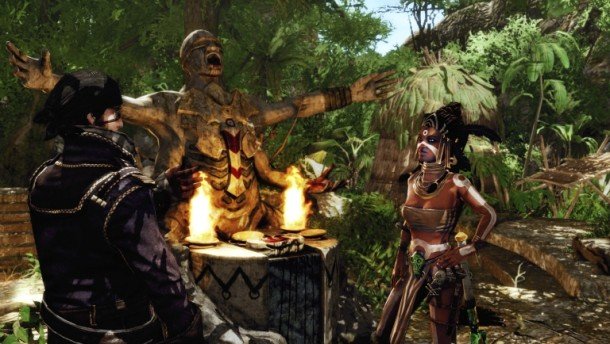
I arrive on Tacarigua and start looking for work. The Inquisition want me to deliver a message to the pirate camp across the island. To get there I'll need to buy a map off Governor Di Fuego. But before the guards will even let me approach him, I need a shirt.
Like the first Risen, and the Gothic series before it, Risen 2: Dark Waters doesn't do power fantasy. After a short, plot heavy stint on the opening island, the nameless character of the first game is sent to the island of Tacarigua with a sword, a pair of trousers and the broad instruction to infiltrate a band of pirates. How to survive long enough to come close to completing that task is left entirely to the player to work out.
It's disorienting. So many games coax you through their opening hours, but Risen 2 has no quest markers, no mini-map and only broad hints from the NPCs as to the location and process of completing missions. It's also hugely liberating, and overcoming the challenges presented can be a profoundly satisfying experience.
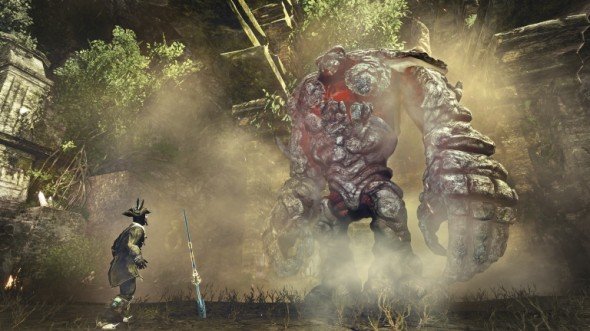
The plot starts with the protagonist working as an officer for the Inquisition—a sort of empire expanding amalgam of the Spanish and British. Their supply lines have been cut off by a Kraken, sent by the titan lord Mara. After receiving word of a weapon that can defeat the sea-beast, he's tasked with infiltrating the pirate gang of its owner, the legendary Steelbeard.
That means going undercover—shedding allegiances in order to plausibly pass as one of the game's rum-guzzling rapscallions. And while I started with nothing, I was free to work for anyone—from the slave-keeping governor, to a drunken, bitter slacker selling plans to a heist of the nearby rum distillery.
In the first few hours I stole everything I could get my hands on from both pirate and Inquisition factions, performed countless odd jobs and even persuaded my companion Patty to spend a day in the kitchen by suggesting she also swipe some provisions to help our quest.
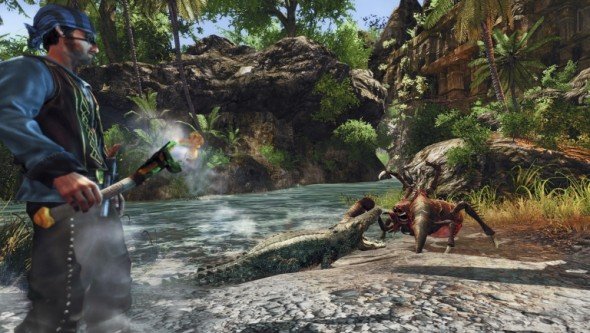
I liked the way paying attention to conversation options in Risen 2 rewarded me. When the governor of Tacarigua attempted to sell me the map of the island, I persuaded him to hand it over for free because I needed it for another mission I'd accepted on behalf of the Inquisition. But I was also permanently locked out of completing a sidequest that could have netted me a handy 1,000 gold simply because I was too friendly with one character on our first encounter.
The biggest gaming news, reviews and hardware deals
Keep up to date with the most important stories and the best deals, as picked by the PC Gamer team.
Other beneficial interactions hinged on my skill at intimidation and persuasion. Learning to do anything in Risen 2 is a complicated process. Completing missions and killing things (even the docile turkeys) gives Glory. This can be spent on increasing your Attributes: five traits that govern competence in broad areas, such as aptitude with blades, general toughness or potential success at special conversation options.
But specific actions, like pickpocketing, or even kicking and crouching, must be taught by trainers. It's here that things quickly get expensive. My predilection for larceny had me quickly rising up the cunning skill tree, but it came at the cost of combat skill and resistance to attacks. The game is full of tough choices for character advancement—do you spend money on an improved weapon, or on a skill to let you use your existing weapon more effectively?
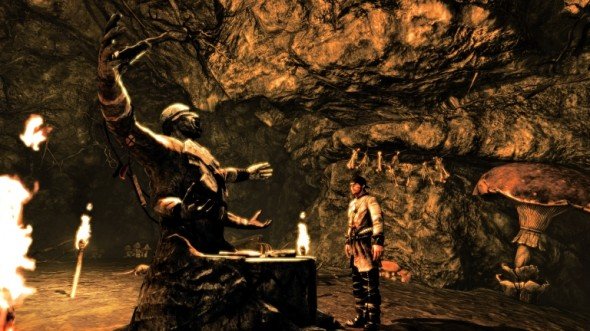
Thick jungles and crumbling tribal ruins may make for an interesting RPG setting, but graphically the game struggles to do its pirate setting justice. Background textures are generally low-res, especially on buildings and scenery, trees shift in size to hide the low draw distance, and characters regularly clip through pieces of their clothing. Risen 2's atmospheric lighting engine manages moments of beauty now and then, though. As I veered off the path connecting the two factions, I stumbled across a cave hidden in a cliff face. Inside, crystal formations growing out of the wall cast some cool, eerie light on my path that behaved differently than my torch. But compared to The Witcher 2, Risen 2 doesn't have the same fidelity. While it may throw more vegetation and bright, primary colors at the player than its polished, Polish peer, it can't match it for detail or realism.
But the technical lapses pale in significance against the game's most troubling area: combat. It's highly situational—fights against animals are simple, despite some variety by type, whereas human opponents can provide a drawn out challenge. Enemies have an annoying tendency to spam attacks, and creating an opening can be a fiddly and imprecise process. As a result, battles are as much about health management as they are swashbuckling adventure.
By the third island it had begun to show some variety. Guns work in place of a projectile magic attack, taking a big hit from an enemy health bar, but needing a long recharge time before the next use. I also discovered a native tribe who taught me the art of voodoo. The demo finished before I could experience its use in combat, but the available recipes suggested cursed voodoo dolls and black magic.
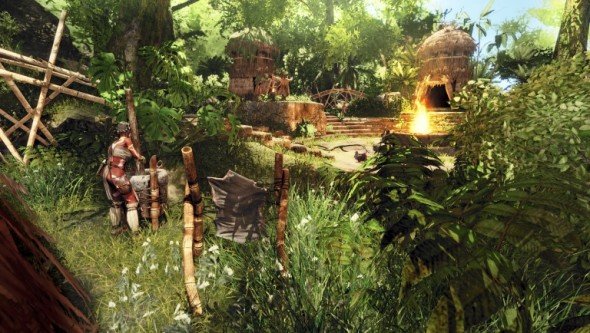
The other application of voodoo did provide some use. The alchemy skill finally made useful all the various plants I'd collected along the way. Brewing up a thief skill-boosting potion, I bolstered Lockpick enough to clean the tribe out of a locked chest full of even more ingredients. Despite the many areas where Risen 2 is deliberately obtuse, the math behind its primary systems is transparent enough to make effective use of them.
It's a game that leaves me equally optimistic and worried. If it can make the most of its unforgiving quest structure, it could become a deep and lasting experience for anyone looking for something more intricate than the genre currently offers. But by the end of the demo, when I was made to fight eight tribesmen with an endless supply of spears to throw, I was cursing the cheap attempts to up the difficulty. Hopefully the full game will include enough skills and variety to bolster its weakest elements.

Phil has been writing for PC Gamer for nearly a decade, starting out as a freelance writer covering everything from free games to MMOs. He eventually joined full-time as a news writer, before moving to the magazine to review immersive sims, RPGs and Hitman games. Now he leads PC Gamer's UK team, but still sometimes finds the time to write about his ongoing obsessions with Destiny 2, GTA Online and Apex Legends. When he's not levelling up battle passes, he's checking out the latest tactics game or dipping back into Guild Wars 2. He's largely responsible for the whole Tub Geralt thing, but still isn't sorry.

